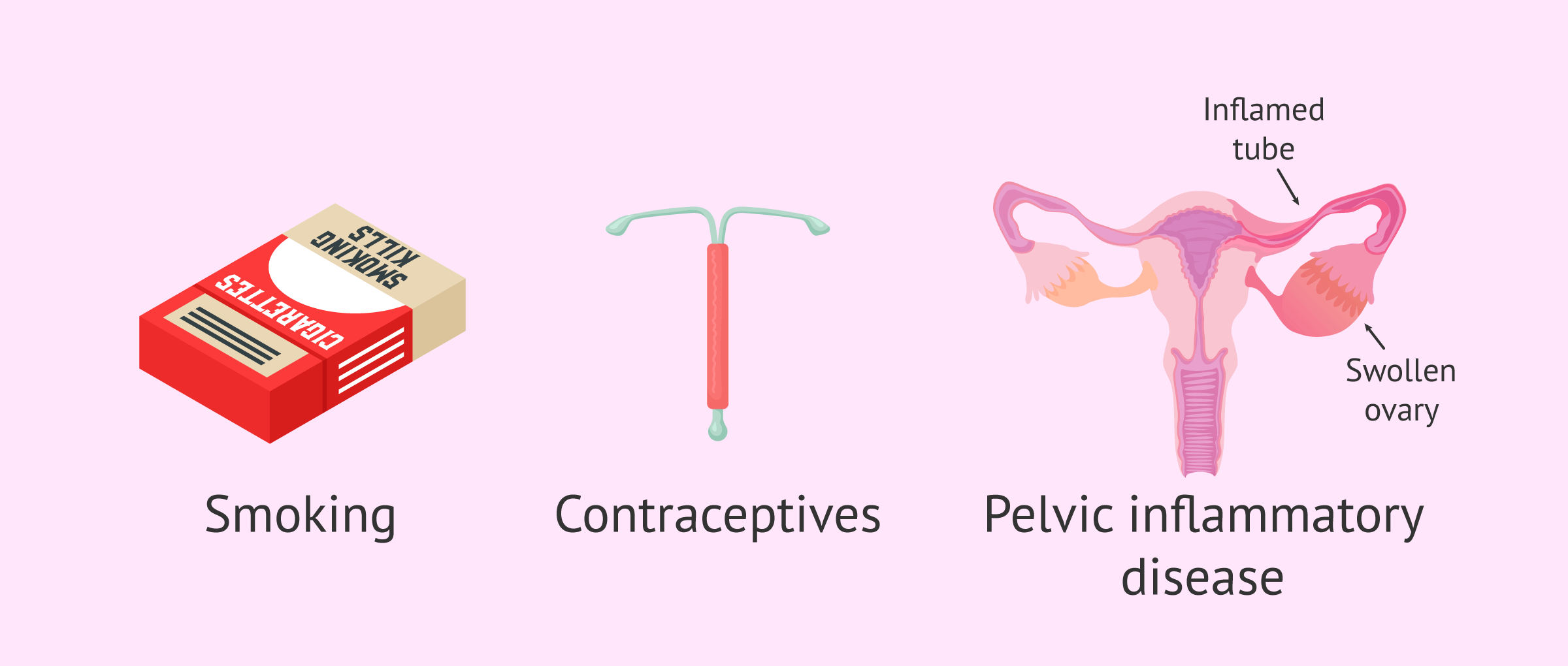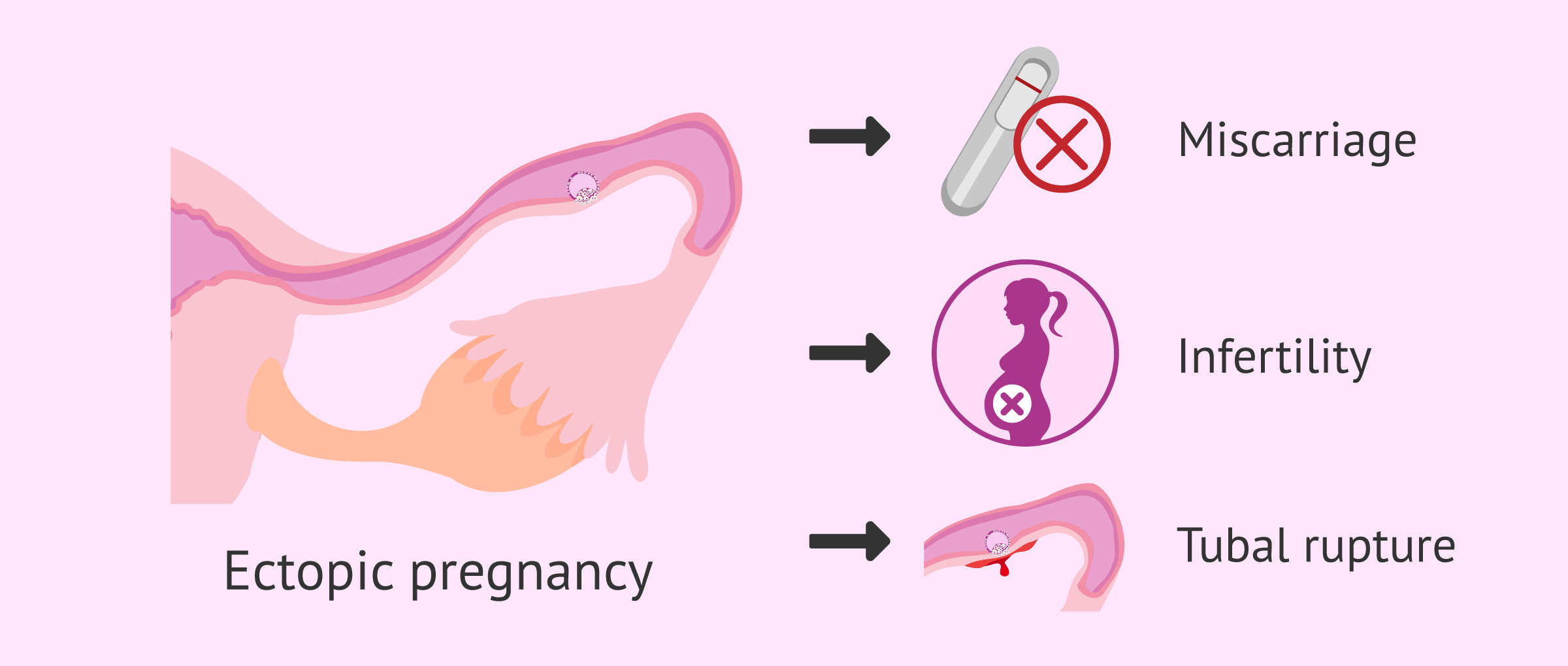When fertilization occurs in the fallopian tubes, that is, the union between the egg and the sperm, the embryo descends through the fallopian tube until it reaches the uterus. This is where the implantation of the embryo takes place to give rise to pregnancy.
The term ectopic pregnancy is used in those cases in which the embryo implants outside the uterus such as in the tubes, ovary, or cervical canal, for example. Therefore, an ectopic pregnancy must be treated effectively after its detection to avoid possible complications in the woman such as tubal rupture or fertility problems.
Provided below is an index with the 7 points we are going to expand on in this article.
- 1.
- 1.1.
- 2.
- 3.
- 4.
- 4.1.
- 4.2.
- 4.3.
- 4.4.
- 4.5.
- 4.6.
- 4.7.
- 5.
- 6.
- 7.
Why does ectopic pregnancy occur?
The exact reason why ectopic pregnancies arise is unknown. However, the most common cause of an extrauterine pregnancy is a malformation, narrowing, or obstruction of one of the fallopian tubes. These tubal alterations prevent the embryo from descending and making its normal journey to the uterus.
The incidence of ectopic pregnancy in the population is 1%, which means that there will be one extrauterine pregnancy for every 100 pregnancies.
Although this is the most common, there are also other factors that may influence the occurrence of ectopic pregnancy. Some of them are listed below:
- Smoking. The risk of ectopic pregnancy is multiplied by 2 when a woman smokes more than 20 cigarettes a day. This risk is due to the toxic effect that nicotine exerts on the tubal milieu.
- The use of certain contraceptives. Birth control pills contain hormones such as progesterone and estrogens that can slow the passage of the embryo through the fallopian tubes, favoring implantation in the fallopian tubes. Also the intrauterine contraceptive device (IUD) can increase the risk of getting a pelvic infection or cause inflammation of the tubes. This indirectly increases the risk of ectopic pregnancy.
- Pelvic inflammatory disease (PID). Inflammation of the pelvic structures, uterus and fallopian tubes occurs, preventing the passage of the embryo into the uterus.
In 50% of ectopic pregnancies, there is this clinical history. The detailed study of the woman and the personal situation of each pregnancy is very important to determine the cause or causes. This will prevent or reduce the possibility of extrauterine gestation occurring again.
Risk Factors
Although there are different causes associated with ectopic pregnancy, this complication can occur in any pregnant woman.
However, there are also some risk factors that can lead to ectopic pregnancy. These include the following:
- Endometriosis: is the growth of endometrial tissue outside the uterus. This can cause a tuboperitoneal alteration, that is, an alteration in the tubes or in the tubo-ovarian space.
- Hormonal imbalances caused by the anti-estrogenic action of clomiphene citrate in ovulation induction treatments. These drugs can cause alterations in tubal motility.
- The existence of previous ectopic pregnancies multiplies the risk of having a new ectopic pregnancy by 7 to 10 times. Although it is true that this factor is generally associated with others.
- Tubal ligation or subsequent tubal recanalization can increase the risk of ectopic pregnancy, as can other operations such as appendectomy, which can lead to the development of peritoneal adhesions.
Apart from all these risk factors mentioned above, women over 35 years of age, sexually transmitted infections and becoming pregnant with an intrauterine device (IUD) can also increase the likelihood of ectopic pregnancy.
Ectopic pregnancy
Any assisted reproductive technique is a risk factor for ectopic pregnancy to occur. This does not mean that any woman who resorts to assisted reproduction will suffer extrauterine embryo implantation.
Assisted procreation, as any other medical treatment, requires that you rely on the professionalism of the doctors and staff of the clinic you choose. Obviously, each clinic is different. Get now your Fertility Report, which will select several clinics for you out of the pool of clinics that meet our strict quality criteria. Moreover, it will offer you a comparison between the fees and conditions each clinic offers in order for you to make a well informed choice.
If we focus on ectopic pregnancies caused by assisted reproduction techniques, specifically in vitro fertilization, either by conventional IVF or by ICSI (intracytoplasmic injection of embryos), it should be noted that the reason why embryos can come out of the uterine cavity and implant elsewhere is due in part to the embryo transfer technique itself.
This is influenced by factors such as the volume of fluid to be transferred, the location of the transfer cannula in the uterine fundus, uterine manipulation, the experience of the specialist, etc.
In the case of pregnancies produced by IVF with ovodonation, the risk of ectopic pregnancy is lower compared to pregnancies with the patient's own eggs. There are several studies that indicate the reason for this difference. These studies claim that ovarian stimulation may decrease endometrial receptivity and increase the possibility of ectopic pregnancy. Therefore, it would be convenient to perform the embryo transfer in deferred, i.e., in the following cycle according to these studies.
Complications of ectopic pregnancy
An ectopic pregnancy is a serious complication of pregnancy, as it endangers the mother's health if not detected in time. Therefore, in the event of any abnormal bleeding, severe waist pain, fainting, severe cramping, etc., it is recommended to consult a specialist as soon as possible.
Most commonly, an ectopic pregnancy will result in miscarriage naturally, i.e. without medical or pharmacological intervention. The embryo is not capable of developing in a place other than the uterus.
However, if the ectopic pregnancy does not end naturally, complications arise. Rupture of the fallopian tubes may occur, which should be attended to immediately by a physician. Although it can occur, this complication is not common. Another consequence of an ectopic pregnancy is female fertility problems.
FAQs from users
What are the causes of ectopic pregnancy?
We speak of ectopic pregnancy when the fertilized egg implants and grows outside the uterine cavity. This usually occurs mainly in the fallopian tubes (more than 95% of cases), what we know as tubal pregnancy, although the embryo can also nest in an ovary, in the abdomen or in the cervix, what we call extratubal pregnancy.
The causes that can hinder or prevent the normal movement of the ovum towards the uterine cavity are, mainly, the following:
- Congenital defects in the fallopian tubes.
- Endometriosis, which favors early nesting.
- Previous infections.
- Scars from previous pelvic surgeries or infections.
- Embryonic factors, such as aneuploidies.
- Maternal age over 35 years.
- Smoking.
- Ovarian hyperstimulation.
- Pelvic inflammatory disease (P.I.D.) caused mainly by salpingitis.
- Previous ectopic pregnancy.
Why do ectopic pregnancies occur?
Ectopic pregnancy occurs when the embryo implants outside the endometrial cavity. When this happens, in most cases, the implantation occurs in the fallopian tube, although it can also be seen in other locations such as the ovary, cervix and even the abdomen.
There are different factors that increase the risk of this occurring: history of pelvic inflammatory disease, previous ectopic pregnancy, previous cesarean section, endometriosis, IUD, contraceptives with only gestagens, postcoital pill and assisted reproduction techniques.
How can ectopic pregnancy be prevented?
Embryo implantation outside the uterus cannot be prevented, but it is possible to take into account the risk factors to reduce the probability of its occurrence. In addition, it is important to know if there is a history of ectopic pregnancy in the family and to inform the physician of any anomaly as soon as possible.
Is an ectopic pregnancy the same as a heterotopic pregnancy?
Not exactly. Heterotopic pregnancies are those in which an intrauterine pregnancy occurs together with an extrauterine pregnancy, i.e. ectopic. This type of gestation has an incidence of 1 in every 1,000 pregnancies, so it is not common.
Is an ectopic pregnancy the same as a heterotopic pregnancy?
Not exactly. Heterotopic pregnancies are those in which an intrauterine pregnancy occurs together with an extrauterine pregnancy, i.e. ectopic. This type of gestation has an incidence of 1 in every 1,000 pregnancies, so it is not common.
What is the most common site of extrauterine embryo implantation?
Most ectopic pregnancies occur by implantation of the embryo in the fallopian tube. Specifically, this embryo implantation usually occurs in the ampullary portion of the tube.
However, there are also cases where the embryo implants in the ovaries among others. However, this is not common.
What is an interstitial ectopic pregnancy?
An interstitial gestation is an unusual type of pregnancy characterized by implantation of the embryo in the tubal portion that passes through the wall of the uterus. Therefore, it is an ectopic pregnancy since a large part of the gestational sac is located outside the uterus.
This type of ectopic pregnancy has a high morbidity and mortality rate. Its incidence is 2-4% of extrauterine gestations.
Recommended readings
If you want to learn more about ectopic pregnancy, you can visit the following article: What is ectopic pregnancy? - Types, symptoms and diagnosis.
We make a great effort to provide you with the highest quality information.
🙏 Please share this article if you liked it. 💜💜 You help us continue!
References
Erin Hendriks, Rachel Rosenberg, Linda Prine. Ectopic Pregnancy: Diagnosis and Management. Am Fam Physician. 2020 May 15;101(10):599-606.
Farquhar CM. Ectopic pregnancy. Lancet. 2005 13-19;366 (9485):583-91.
Laura L Marion, George Rodney Meeks. Ectopic pregnancy: History, incidence, epidemiology, and risk factors. Clin Obstet Gynecol. 2012 Jun;55(2):376-86. doi: 10.1097/GRF.0b013e3182516d7b.
Li C, Zhao WH, Meng CX, et al. Contraceptive Use and the Risk of Ectopic Pregnancy: A Multi-Center Case-Control Study. PLoS One. 2014; 9(12):e115031.
Protocolos SEGO. Embarazo ectópico. Prog Obstet Ginecol.2007;50(6):377-85.
Zee J, Sammel MD, Chung K, et al. Ectopic pregnancy prediction in women with a pregnancy of unknown location: data beyond 48 h are necessary. Hum Reprod. 2014; 29(3):441-7.
FAQs from users: 'What are the causes of ectopic pregnancy?', 'Why do ectopic pregnancies occur?', 'How can ectopic pregnancy be prevented?', 'Is an ectopic pregnancy the same as a heterotopic pregnancy?', 'Is an ectopic pregnancy the same as a heterotopic pregnancy?', 'What is the most common site of extrauterine embryo implantation?' and 'What is an interstitial ectopic pregnancy?'.
Authors and contributors

More information about Cristina Algarra Goosman






Hello, a few years ago I had an ectopic pregnancy, the baby was implanted in the tubes and of course, I did not know it and I burst a tube.
They had to do a reconstruction, they almost took it out. Now I want to try again but I am afraid that the same thing will happen again. Would I be putting myself at risk?
Hello Melissa,
Ectopic pregnancy can have various causes, it would be advisable to go to an assisted reproduction clinic so that they can assess if there is any problem affecting the functioning of the reproductive system, especially if you have undergone reconstructive surgery of the fallopian tube.
It is important for the achievement of a natural pregnancy that the fallopian tubes are functional and permeable.
I hope I have helped you.
Best regards
Hi, I had an ectopic pregnancy and eventually lost it naturally. I want to try again but I don’t know if I can do it now. How much time has to go by before I try again?
Hi Ashleymarie,
Generally, the WHO recommends waiting 6 months before attempting to seek another pregnancy after an abortion. However, there are doctors who after evaluations and scans give the go-ahead after 3-4 months, also taking into account the appearance and emotional state of the patient.
I recommend you to read this article: How long does it take after an abortion to try to get pregnant?
I hope I have helped you.
Best regards.